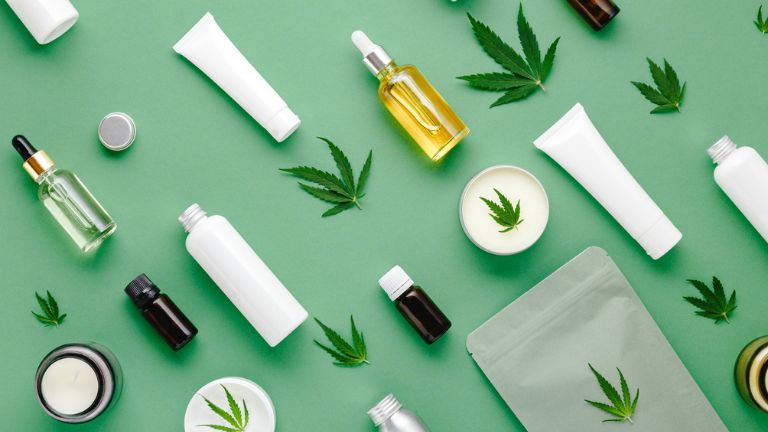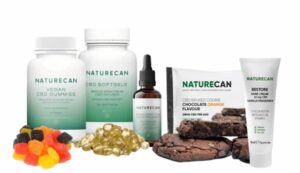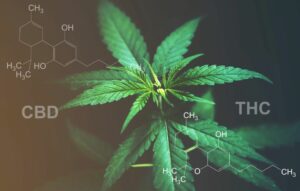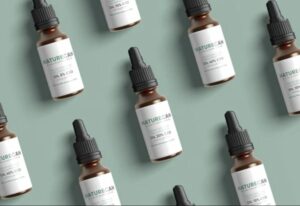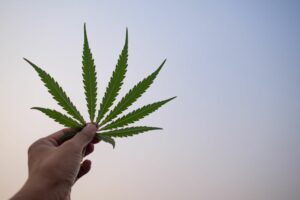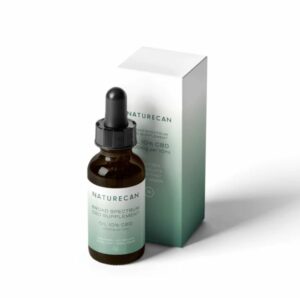Is CBD safe? Is it legal? Will it make me high? Here are the 5 red flags to look out for when starting your relationship with CBD
CBD – we’ve all heard of it, and its popularity speaks for itself with A-list celebrities vouching for its effectiveness and The Financial Times reporting that projected sales are to exceed £2.5 billion in Europe this year!
But what do we really know about this potent and popular product?
Here at Healthista, we’ve had many different CBD products cross our desks. Moisturisers, lubricants, lip balms, candles, bath bombs, gummies and even some foods.
Of those products, we’ve seen labels with typos and others that quite literally taste like we’ve ingested dirt! In fact, we only have a few favourites from trustworthy brands such as Naturecan, that we’re confident in using.
There are so many questions surrounding CBD, and as editor of Healthista I’m supposed to know the answers, but even I get confused.
Does it get you high? How is it made? Is it legal? Is it safe? How can we spot a trustworthy brand? Why has it become so popular?
Let’s look a little closer into what CBD is and how we can be sure we are buying into safe and effective brands. Here are the 5 CBD red flags to look out for…
Red Flag #1 They’re messing with your head
Look for: non-detectable levels of THC.
When hearing about CBD it’s assumed that it comes from cannabis and so must work in the same way as smoking marijuana also known as ‘weed’.
CBD and THC are both cannabinoids, however one is safe and legal and the other is psychoactive and not legal for sale in the UK.
CBD is short for Cannabidiol, a naturally sourced compound found in relative abundance in hemp plants that have been bred to contain only trace amounts of THC (tetrahydrocannabinol).
THC is the psychoactive component found in the cannabis plant that unlike CBD gives users the ‘high’ associated with cannabis use.
Legality differs from country to country, but it is generally accepted in most countries.
you can be rest-assured it won’t be messing with your head
For CBD products to be compliant with UK law, they must contain less than 1mg of THC and should be non-detectable in products sold in the UK as it is a controlled substance under the Misuse of Drugs Act.
As CBD does not cause a high and has no psychoactive properties, you can be rest-assured it won’t be messing with your head.
What it can do though, is enhance the effects of brain chemicals, such as serotonin, dopamine and anandamide, by working directly on the endocannabinoid system in the brain.
This can help to reduce pain perception, relieve anxiety and stress, improve sleep and lift mood. It is also a powerful antioxidant which can help suppress inflammation.
READ MORE: CBD oil: 3 A-listers that love it and EXACTLY what it is and what it does
‘Research on CBD is still in its infancy,’ explains Paul Holmes, Naturecan’s Scientific and Regulatory Affairs Manager.
‘Consumers are using CBD for a range of ailments including anxiety, stress, sleep problems and pain relief.
‘The efficacy of CBD for the treatment of these is still to be fully explored, but there are many subjective reports from users who experience therapeutic CBD benefits’.
CBD does not appear to have abuse potential or cause harm
When buying into a brand, to be on the safe side, you should always look for hemp derived CBD, opposed to the marijuana-based option.
‘The World Health Organisation (WHO) has classified CBD as generally well tolerated with a good safety profile,’ says Holmes.
‘They also stated that CBD does not appear to have abuse potential or cause harm’.
Usage should be kept to people over the age of 18 and should not be used by pregnant or breastfeeding women.
Red Flag #2 They aren’t loyal
Look for: brands that contain only the CBD element of the hemp plant.
Brands that aren’t loyal to CBD (or the law for that matter) and sell non-legal cannabinoids to customers in the UK are a major red flag and should definitely be avoided.
‘Cannabigerol (CBG) and Cannabinol (CBN) – which look and sound very familiar to cannabidiol – are two other cannabinoids found in the cannabis plant alongside CBD and THC,’ explains Holmes.
Watch out for these in the ingredients though, if a brand is selling CBG or CBN cannabinoids in the UK they are not abiding by the law.
the maximum daily intake should be no more than 70mg
In fact, CBN in particular is a degradation of THC and is therefore classified as an illegal controlled substance in the UK due to its ‘high’ causing nature.
CBG should not be sold in the UK in an edible or ingestible format, however there are some products containing CBG that are legally available in the UK.
When in oil form, it is placed under the tongue (sublingually), as this is a faster method of absorption than taken orally with other forms such as tablets, capsules or topicals.
‘Guidance from the Food Standards Agency (FSA) states that the maximum daily intake of CBD should be no more than 70mg,’ says Holmes.
‘Not only is it important to follow dosage guidelines on products but you should also be able to see the CBD concentration clearly displayed on the label’.
READ MORE: 10 CBD oil questions answered
Red Flag #3 They’ve got a problem with authority
Look for: a brand on the FSA novel food list or other reputable product comparison sites.
When looking for safe products in the UK, the novel foods list is a great starting point. For those who aren’t sure, novel foods are products which have not been widely consumed previously by people in the UK or EU.
CBD is classified as a ‘novel food’ according to the UK regulator Food Standards Agency (FSA). As a novel food, all CBD products must be authorised before they can be sold in the UK.
In fact, Paul Holmes says, ‘all ingestible CBD products in the UK should be listed on the FSA Novel Food List and any product not listed should not be sold and will be subject to enforcement by Trading Standards’.
In April 2022, more than 900 applications of brands were listed on the UK FSA’s CBD public list which means they are in line for assessment and approved.
all CBD products must be authorised before they can be sold in the UK
In order to apply for authorisation, brands must conduct many different safety and quality tests including studies to demonstrate how the body deals with CBD when consumed.
In recent years, the FSA have started to review applications, and those who do not meet required standards are no longer able to be sold in the UK. Brands like Naturecan that are still able to be sold can be found on this government controlled list.
‘You can also look for safe and legal brands on reputable product comparison sites such as Labdoor or Leaf Report, where Naturecan are the highest rated CBD company in the UK and Europe,’ reveals Holmes.
READ MORE: 5 CBD benefits for women you didn’t already know about
Red Flag #4 They’re overpromising
Look for: brands that don’t make outlandish claims.
‘Our CBD will cure your anxiety’, ‘our CBD will give you the best night’s sleep you’ve ever had’ – these are the sort of claims I’m talking about.
There are many brands and adverts out there on the miracle product that is CBD, promising a plethora of benefits and even cures for common ailments.
the FSA has not currently approved any claims regarding the benefits
And indeed, many consumers, brands and even Healthista favourite and trustworthy brand Naturecan has hundreds of customer testimonials a on how they believe CBD has helped them in their daily life.
Research into benefits is ongoing, however the FSA has not currently approved any claims regarding the benefits of supplementing with CBD.
So if you notice any brands making outlandish claims or overpromising to cure you overnight, then not only are they not abiding by the law, they certainly aren’t worthy of your trust or custom.
Red Flag #5 They only talk about themselves
Look for: brands with third-party certification.
If a brand is claiming it is of high quality but has no independent parties, then you can be assured of another red flag.
Looking for brands who have independent certification, testing and verification of quality, is one of the best ways to weed out untrustworthy brands. Certifications such as Labdoor and Leaf Report will be able to authenticate any claims.
‘Looking for third-party laboratory test results is another great way to tell if a product is high quality or not,’ explains Holmes.
‘You can check the lab results to confirm that the amount of CBD in the product matches the label claims and that there is no or minimal THC.
‘Other things to look out for in lab results are microbial results to check for bacterial contamination as well as other contaminants such as heavy metals and pesticides, all of which should not be present in a high-quality product’.
Looking to try CBD? Shop Naturecan’s range here and get 30% off your order using code: HEALTH30
Naturecan are proud to be the UK’s number 1 CBD brand for quality and value for money (Labdoor 2022).
Naturecan is crafted from organically-grown sources and due to special manufacturing processes ensures that their CBD is of the highest quality and purity.
All Naturecan’s products contain 0.01% THC guaranteed by third party lab testing. For more information visit their website uk.naturecan.com
Like this article? Sign up to our newsletter to get more articles like this delivered straight to your inbox.



